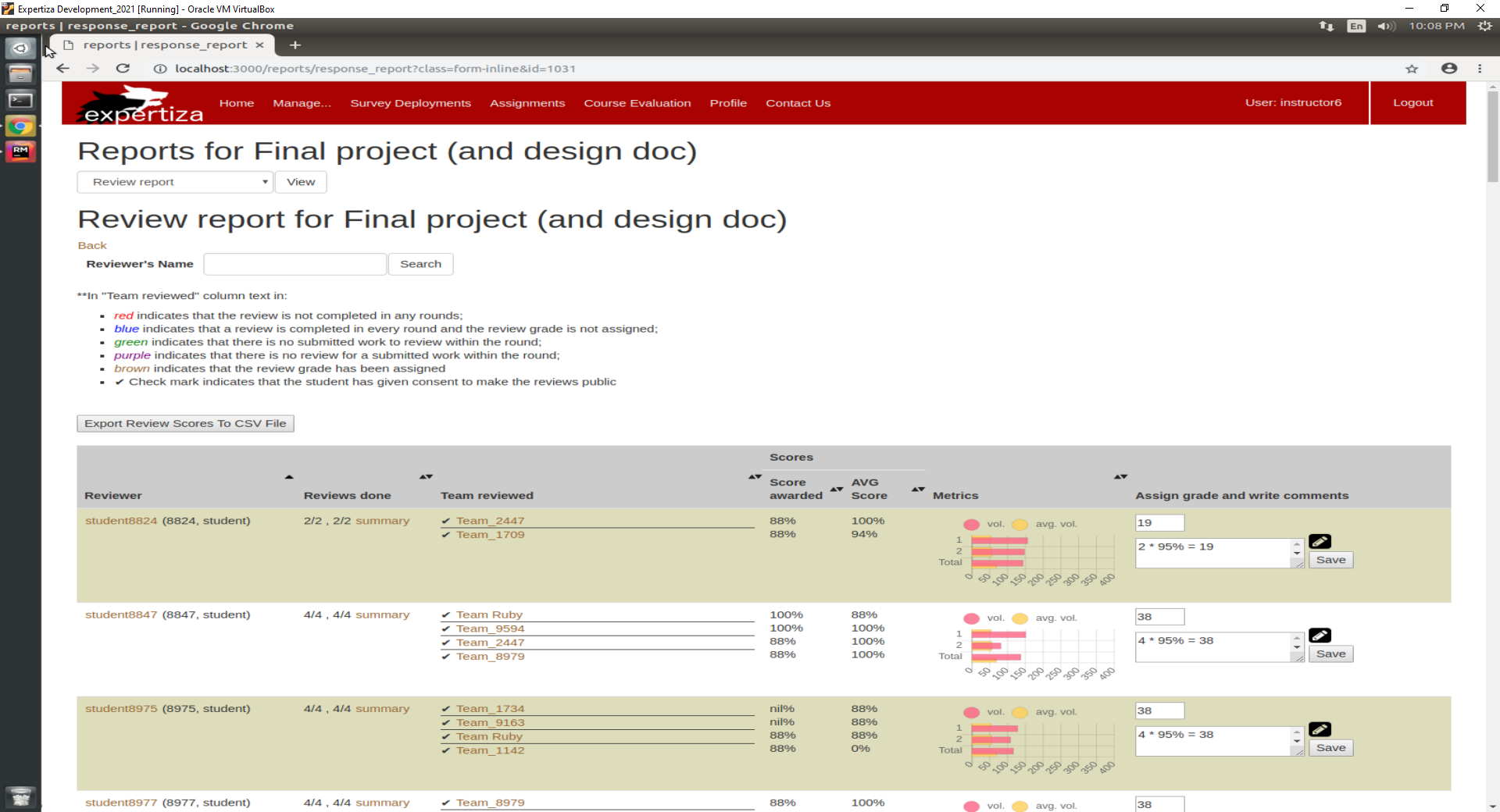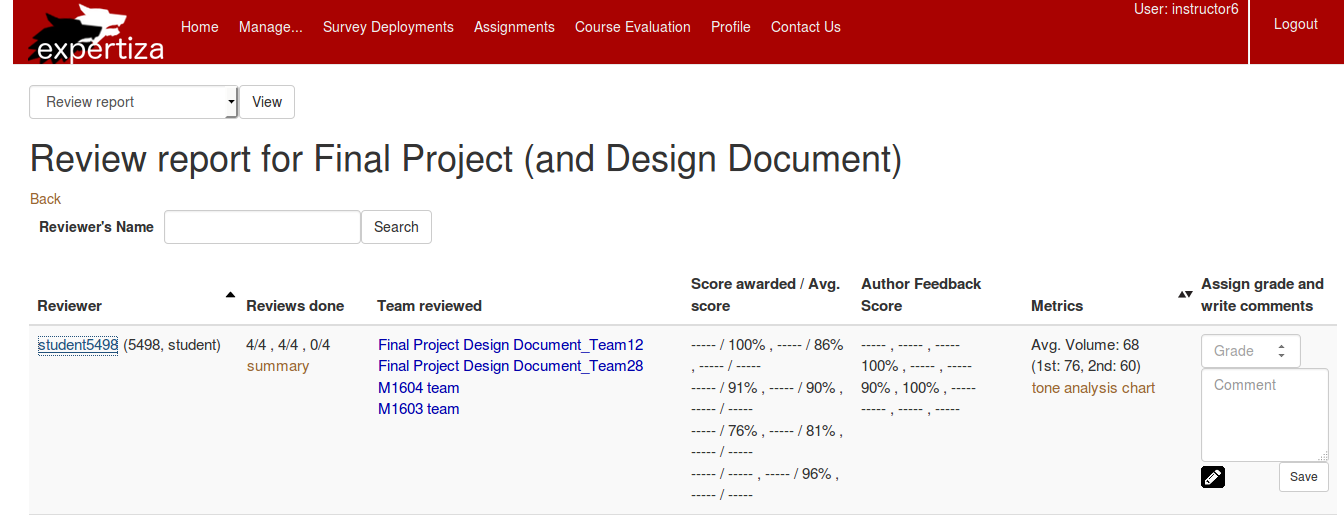CSC/ECE 517 Spring 2021 - E2109. Completion/Progress view: Difference between revisions
No edit summary |
|||
| Line 100: | Line 100: | ||
='''References'''= | ='''References'''= | ||
#https://expertiza.csc.ncsu.edu/index.php/CSC/ECE_517_Fall_2018/E1876_Completion/Progress_view | #https://expertiza.csc.ncsu.edu/index.php/CSC/ECE_517_Fall_2018/E1876_Completion/Progress_view | ||
#https://docs.google.com/document/d/1uzr5pybVKYr_K1Q8wSd4t-Id9nqTt3k1ePseDjY-RJg/edit# | |||
Revision as of 03:18, 6 April 2021
Problem Statement
Expertiza allows users to complete peer reviews on fellow students' work. However, not all peer reviews are helpful, and some are more useful than others. Therefore, the application allows for the project's authors to provide feedback on the peer review, this is called "author feedback." The instructors have no easy way to access the author feedback while grading peer reviews, which would be a useful feature to have since this shows how helpful the peer review actually was to the group that received it. Thus, making the author feedback more accessible is the aim of this project. However, a group in 2018 was tasked with this project as well, and most of the functionality appears to have been implemented already, but that is in an older version of Expertiza. Our primary task is then to follow their implementation, refactor any code that may require it, make the suggested improvements that were left in their project feedback and make the feature compatible with the latest beta branch of Expertiza. Secondary tasks are to make the author feedback column toggleable and to refactor the function that averages author feedbacks so that it reuses existing code that exists somewhere in Expertiza already.
Goal
- Our primary goal is to take the author feedback column functionality from the 2018 branch and update it so that it merges successfully with the current beta branch.
- In the 2018 branch, there is an author feedback column to the review report, but the previous team's submission added new code to calculate the average. However, this most likely already exists somewhere else in the system, and so we will identify where that functionality exists and refactor the code to reuse it to follow the DRY principle.
- Part of the 2018 group's feedback said that the review report UI began to look somewhat crowded in its appearance. However, there is often no author feedback, and so the column for that should be made toggleable. So we will make it so that the column is dynamic and will only be present if there is author feedback to display. The user could then toggle the column to show or hide that information depending on their own preference.
Design
Below is the current implementation of the page we are going to edit on the beta branch. It can be seen that the "author feedback" column is not present in this view at all.
Here is the 2018 group's version of the page we are editing. It has the "author feedback" column as well as the necessary functionality. However, the user interface has clearly changed since 2018, and therefore, there will likely be merge conflicts between their branch and the current beta branch. Part of our task would then be to resolve those merge conflicts and port the functionality back over to the most recent beta branch. (Sourced from this link)
Currently, in the 2018 group's branch, the entries in the "Score awarded/Avg. score" and "Author Feedback Score" columns contain a lot of missing entries. Though, this does not appear to be the case in the most recent beta branch available in 2021. Therefore, we would add this filter (i.e. code that removes the missing entries represented by the dashes) to the missing entries available in the beta branch to the 2018 group's branch code.
In addition, the 2018 group's branch has the author feedback in its own column in-between "AVG score" and "Metrics". Instead, we will move it under the same header column "Scores" as seen in the current beta branch, just to the right of the "AVG Score" column. To accommodate for this additional column being introduced, the "Team reviewed" column width would be reduced a bit so that the "Scores" column renders approximately at the same location on the page.
Files to be Changed
The below files are expected to receive edits by our group to complete this project:
- app/views/reports/_review_report.html.erb
- app/controllers/review_mapping_controller.rb
- app/models/on_the_fly_calc.rb
- app/views/reports/response_report.html.haml
- app/views/reports/_team_score.html.erb
Implementation Plan
Like the 2018 group, we plan to add three methods to the on_the_fly_calc.rb file in Models. These methods are:
- compute_author_feedback_scores
- calc_avg_feedback_score(response)
- calc_feedback_scores_sum
However, they calculate the average with a custom implementation that most likely exists somewhere else in Expertiza already as suggested by the instructors. As part of our project, we will identify where that functionality exists, and either reuse it or extend it so that it can be reused here instead. Though, we will first implement the functionality as the previous group did, and then slowly perform our refactor to ensure functionality is not broken by the refactoring process.
Since we will need to modify the user interface to introduce the author feedback column, we expect to add a column within the .erb files in the views folder that were identified above. These files were selected as they were the files necessary for the previous group to implement their UI changes.
They also add a 'calculate_avg_score_by_feedback' method to the controller for the file 'app/controllers/review_mapping_controller.rb'. The following method was written by the previous team to calculate the average scores for the feedback given by authors for the reviews of their work.
def calculate_avg_score_by_feedback(question_answers, q_max_score)
# get score and summary of answers for each question
# only include divide the valid_answer_sum with the number of valid answers
valid_answer_counter = 0
question_score = 0.0
question_answers.each do |ans|
# calculate score per question
unless ans.answer.nil?
question_score += ans.answer
valid_answer_counter += 1
end
end
if valid_answer_counter > 0 and q_max_score > 0
# convert the score in percentage
question_score /= (valid_answer_counter * q_max_score)
question_score = question_score.round(2) * 100
end
question_score
end
Unfortunately, it exists in the controller level logic, and perhaps isn't required to exist there. It is likely better for this method to be moved to this controller's corresponding model, and we will do so during our project to make the code follow the principles of MVC.
Test Plan
The 2018 group wrote a RSpec test when they wrote their function to calculate the author feedback scores. It was located in the on_the_fly_calc_spec.rb file and the method they wrote was called 'compute_author_feedback_scores'. Below is the snippet of the RSpec test that they wrote:
describe '#compute_author_feedback_score' do
let(:reviewer) { build(:participant, id: 1) }
let(:feedback) { Answer.new(answer: 2, response_id: 1, comments: 'Feedback Text', question_id: 2) }
let(:feedback_question) { build(:question, questionnaire: questionnaire2, weight: 1, id: 2) }
let(:questionnaire2) { build(:questionnaire, name: "feedback", private: 0, min_question_score: 0, max_question_score: 10, instructor_id: 1234) }
let(:reviewer1) { build(:participant, id: 2) }
let score = {}
let(:team_user) { build(:team_user, team: 2, user: 2) }
let(:feedback_response) { build(:response, id: 2, map_id: 2, scores: [feedback]) }
let(:feedback_response_map) { build(:response_map, id: 2, reviewed_object_id: 1, reviewer_id: 2, reviewee_id: 1) }
before(:each) do
allow(on_the_fly_calc).to receive(:rounds_of_reviews).and_return(1)
allow(on_the_fly_calc).to receive(:review_questionnaire_id).and_return(1)
end
context 'verifies feedback score' do
it 'computes feedback score based on reviews' do
expect(assignment.compute_author_feedback_scores).to eq(score)
end
end
end
We will examine any possible edge cases that this RSpec test might not cover, and try to further elaborate upon it to ensure that the introduced functionality is safe to add to the Expertiza beta branch.
Also, we will prepare instructions testers can use when interacting with our final result, so that they can quickly find our functionality and evaluate its performance.

